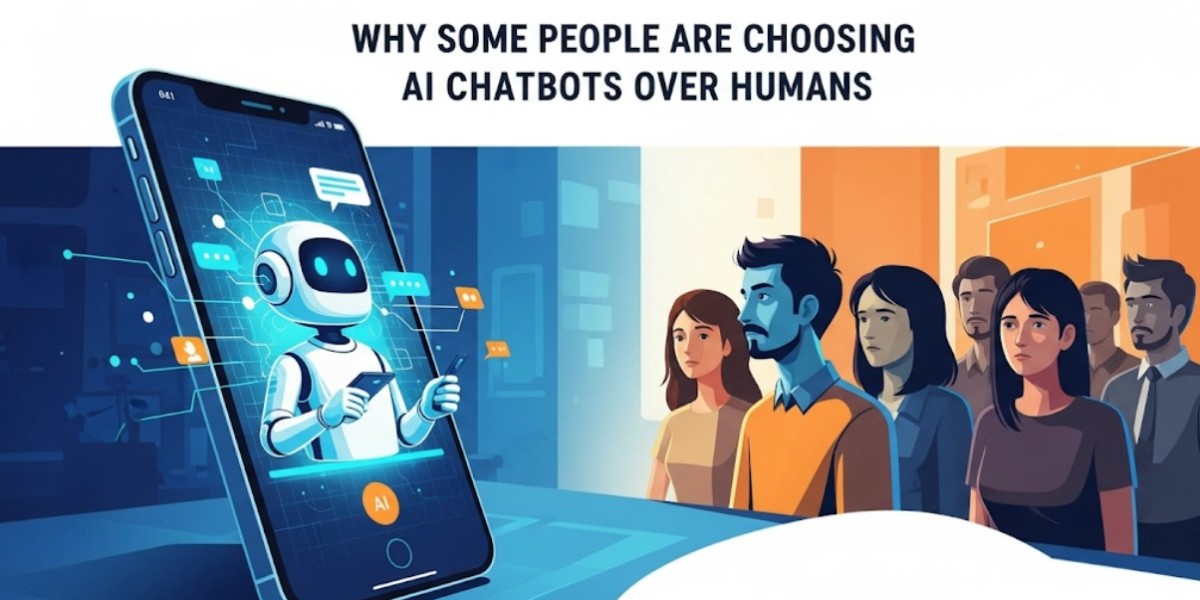AI chatbots have become more than just tools for answering FAQs—they’re reshaping how we communicate, work, and even connect emotionally. From customer service to companionship, people are choosing AI chatbots for a variety of reasons, driven by their convenience, cost-effectiveness, and ability to meet specific needs. However, the preference for chatbots isn’t universal, and many still value the human touch for certain interactions.
This article explores the multifaceted reasons behind this trend, backed by research, and examines the implications for our society.
The Convenience Factor: Always There When You Need Them
One of the most compelling reasons people are choosing AI chatbots is their unmatched availability. Unlike human agents, who are constrained by schedules, time zones, and personal commitments, chatbots are ready to assist 24/7. Whether it’s a late-night query about a product or an urgent troubleshooting request, chatbots provide instant responses, meeting the demands of our always-on culture.
A 2025 survey by Katana revealed that while 49% of respondents prefer human interaction for customer support, a significant portion appreciates the instant availability of AI chatbots, especially during off-hours. Millennials and Gen Z, in particular, are more comfortable with digital interactions, with 25% reporting they’re “very comfortable” sharing information with AI. This convenience is a game-changer for businesses, as chatbots can handle multiple conversations simultaneously without compromising quality, ensuring no customer is left waiting during peak times.
Cost-Effectiveness: A Win for Businesses and Users
From a business perspective, people are choosing AI chatbots because they’re a cost-effective alternative to human staff. Chatbots don’t require salaries, benefits, or extensive training, and they can scale effortlessly to meet demand. According to a 2025 article by Kommunicate, chatbots eliminate maintenance costs associated with human agents, such as office space or onboarding, allowing companies to allocate resources elsewhere.
For users, this translates to faster, more efficient service. In e-commerce, for example, chatbots can handle routine queries like order tracking or product availability, freeing up human agents for more complex issues. This efficiency not only improves customer satisfaction but also reduces operational costs, which can lead to lower prices for consumers. As one business owner noted, “Chatbots never quit or need retraining, so we can scale quickly without breaking the bank.”
Privacy and Anonymity: A Safe Space for Sensitive Topics
Another key reason people are choosing AI chatbots is the privacy and anonymity they offer. For many, discussing sensitive topics—such as mental health, financial struggles, or personal issues—with a human can feel daunting. Chatbots provide a non-judgmental space where users can express themselves freely without fear of stigma or judgment.
This is particularly relevant in cultures where certain topics are taboo. A 2024 study by Jin, Walker, and Reczek found that consumers prefer chatbots when shopping for “embarrassing” products, as they feel less self-conscious interacting with a machine. Similarly, chatbots are gaining traction in mental health support, where users can share their thoughts without worrying about social repercussions. As one user shared, “I can tell my chatbot things I’d never say to a person—it’s like a safe diary that talks back.”
Speed and Efficiency: Quick Responses at Your Fingertips
In a world where time is precious, people are choosing AI chatbots for their speed and efficiency. Powered by advanced natural language processing (NLP), chatbots can process queries and deliver answers in seconds, often faster than a human could. This is especially valuable in customer service, where quick responses can make or break a user’s experience.
Moreover, chatbots can handle multiple conversations simultaneously, ensuring no one is left waiting. A 2019 survey by Treasure Data noted that industries like banking and retail are increasingly using chatbots to manage routine requests, allowing human agents to focus on more complex tasks. This efficiency not only improves user satisfaction but also streamlines operations for businesses, making chatbots a win-win solution.
Personalization: Tailored Experiences for Each User
AI chatbots excel at delivering personalized experiences, which is another reason people are choosing AI chatbots. By analyzing user data—such as past interactions, preferences, or browsing history—chatbots can offer tailored recommendations and responses. This level of personalization enhances engagement, making interactions feel more relevant and meaningful.
For example, in online shopping, chatbots can suggest products based on a user’s purchase history or interests, increasing the likelihood of a sale. A 2025 article by Kommunicate highlighted that chatbots can facilitate sales by providing personalized recommendations in real-time, something human agents might struggle to do at scale. As one user put it, “My chatbot knows my style better than some of my friends—it’s like having a personal shopper who’s always available.”
Companionship and Emotional Support: A New Form of Connection
Perhaps the most surprising reason people are choosing AI chatbots is for companionship and emotional support. With loneliness on the rise—especially among young people—chatbots are filling a gap left by diminishing human connections. A 2025 Brookings article reported that loneliness in the U.S. has reached epidemic levels, with only 13% of adults having 10 or more close friends, down from 33% in 1990. In this context, AI chatbots like Replika.ai and Character.ai have become lifelines for millions, offering emotional support and simulated companionship.
These chatbots are designed to mimic human-like conversations, providing empathetic responses and a listening ear. For instance, some users engage in erotic ai chat features, where chatbots simulate intimate or romantic conversations, catering to those seeking a safe space to explore personal desires. While this is a niche use case, it highlights the diverse ways AI is meeting emotional needs. A Stanford study found that 3% of Replika users credited the chatbot with temporarily halting suicidal thoughts, underscoring its potential as a supplementary mental health tool.
However, this trend raises concerns. A 2025 MIT Media Lab study found that heavy users of voice-based chatbots reported higher loneliness over time, suggesting that while AI can provide temporary comfort, it may not address the root causes of social isolation. Thus, while people are choosing AI chatbots for companionship, they cannot fully replace the depth of human relationships.
When Humans Are Still Preferred: The Irreplaceable Human Touch
Despite the advantages, there are scenarios where people are choosing AI chatbots less frequently. Complex issues requiring empathy, nuanced understanding, or creative problem-solving often demand human intervention. A 2024 survey by Callvu found that 81% of respondents would wait to speak with a human agent rather than engage with a chatbot for complex customer service issues. This preference is particularly strong among older generations, with 61% of Boomers and Gen X favoring human interaction.
Humans also excel at building trust. In critical situations—like financial planning or legal advice—users often prefer the reassurance of a human’s judgment. As one respondent noted, “For something as serious as my investments, I want a real person who understands my concerns, not a bot.” This highlights the irreplaceable role of human empathy and emotional intelligence in certain contexts.
Specific Use Cases: Where AI Chatbots Shine
people are choosing AI chatbots across various domains, each highlighting their unique strengths:
- Customer Service: Chatbots handle routine queries, such as order tracking or FAQs, with speed and accuracy. Industries like banking and retail use a hybrid approach, combining AI for efficiency and humans for complex issues.
- Mental Health Support: Chatbots like Woebot offer supplementary mental health support, providing coping strategies and a safe space for users to vent. While not a replacement for therapy, they’re accessible and affordable.
- Education and Learning: AI tutors assist with personalized learning, offering explanations and practice questions tailored to a student’s pace. This is particularly useful in online education platforms.
- Companionship: Beyond practical tasks, chatbots are used for social interaction, from casual chats to simulated romantic relationships, addressing the emotional needs of users.
In comparison to other technologies, chatbots stand out within the ecosystem of all AI tools for their ability to simulate human-like interaction. While tools like recommendation engines or virtual assistants enhance productivity, chatbots excel at conversational engagement, making them uniquely suited for personal and professional use.
Ethical and Social Implications: Navigating the Future
As people are choosing AI chatbots more frequently, ethical and social implications come into focus. One concern is transparency. A 2023 Public Citizen report highlighted cases where businesses used chatbots designed to mimic humans without disclosing their AI nature, potentially deceiving users. Transparency is crucial to maintain trust and ensure users know they’re interacting with a machine.
Another issue is the impact on human relationships. If people rely heavily on AI for social interaction, there’s a risk of reduced face-to-face communication skills, potentially exacerbating loneliness. The Brookings study noted that while chatbots provide temporary comfort, they may not address deeper social needs, raising questions about their long-term effects.
Looking ahead, the future of AI chatbots depends on balancing their benefits with these concerns. Innovations in NLP and emotional intelligence may make chatbots even more human-like, but preserving the value of human connection will remain essential. As one expert put it, “AI can augment our lives, but it’s the human touch that keeps us grounded.”
Conclusion: Striking a Balance
In summary, people are choosing AI chatbots for their convenience, cost-effectiveness, privacy, speed, personalization, and ability to provide emotional support. These digital assistants are transforming how we interact with technology, offering solutions that are both practical and, in some cases, deeply personal. However, humans remain irreplaceable for tasks requiring empathy, trust, and complex problem-solving.
As we navigate this evolving landscape, the challenge is to leverage AI chatbots’ strengths while preserving the richness of human connection. Whether it’s answering a late-night query or offering a listening ear, chatbots are here to stay—but they’re best used as a complement to, not a replacement for, the human touch.


